International Policy
Ukraine has said it wants to strengthen human rights during its term – while facing criticism for its own democratic credentials.
Opposition leader Tymoshenko was sentenced to seven years imprisonment in a trial that drew wide international criticism. As a result, she was unable to take part in parliamentary elections in late October, which the OSCE observer mission declared to be unfair and a “step backwards.” 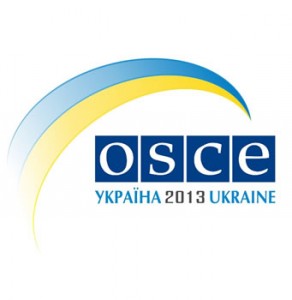
Susan Stewart at the Berlin-based German Institute for International and Security Affairs (SWP) also believes that Ukraine’s reputation has suffered in recent years because of human rights violations and backpedalling on democracy. “That’s why I think it will be difficult for Ukraine to exercise strong leadership,” Stewart said.
Ukraine is the second former Soviet republic to assume the OSCE presidency after Kazakhstan in 2010, which paved the way. But Kazakhstan was also criticized for human rights violations.
The OSCE was created during the Cold War to serve as a forum for dialogue between the warring blocs in the East and West. Today, the Vienna-based organization unites 57 nations from Europe, Central Asia and North America. It fights terrorism, seeks to resolve conflicts and helps protect the environment. Observing human rights and fundamental freedoms is a key part of OSCE’s security concept.
Old divisions threaten to paralyze its work.
Complete Article – Roman Goncharenko – Deutsche Welle
OSCE-Ukraine
Ukraine’s representative at the negotiations on the Transdniestrian conflict settlement, Ihor Kharchenko has said that the Transdniestrian conflict settlement will be the No. 1 priority during Ukraine’s presidency of the OSCE in 2013.
«Евгений Ройзман, глава екатеринбургского фонда «Город без наркотиков» — антигерой западных журналистов…
Либералы среди моих московских друзей от «списка Магнитского» в восторге. Это понятно: дело Магнитского — действительно жуть. Налоговый советник британского Hermitage Capital пытался разобраться с рейдерами, отчасти сотрудниками силовых структур, которые отняли у Hermitage Capital несколько дочерних компаний. В ответ самого Магнитского арестовали, обвинив в том, что он помог британцам уклониться от уплаты налогов. В СИЗО он заболел, его так «лечили», что «залечили», он умер… 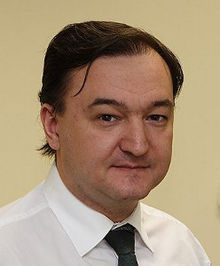
Ответ Москвы свидетельствует об истинном состоянии Великой России… Похоже, самому Путину стало стыдно, раз он убеждал журналистов, что запрет усыновления русских детей американцами — это ответ не на «закон Магнитского», а на то, что американские власти не пускают российских представителей следить, как в США относятся к усыновленным детям. Другими словами, у России нет ответа на американский закон…
…российская оппозиция с энтузиазмом взялась за дело, учредила Независимый совет по правам человека. Его главная задача — как раз составлять новые списки, в качестве возможных фигурантов которых совет уже назвал судей по делам Ходорковского и Pussy riot. И это только начало…
А что выиграют оппозиционеры-правозащитники от своей новой функции внесудебного трибунала для выявления негодяев в госструктурах? … Такая оппозиция напоминает деревенскую бабу, которую постоянно мутузит муж-алкаш. Она зовет соседа, чтобы тот урезонил мужа. Сосед здоровый, мужа пугает, но как только уходит — муж снова мутузит бабу.
Может быть, пора развестись?… Мне кажется, России не нужны американские или европейские списки возмездия. России нужны люди типа Ройзмана, для которых свои наркоманы дороже иностранных корреспондентов».
Статья – Штефан Шолль – Московский Комсомолец № 26126 от 24 декабря 2012 г. Stefan Scholl Moskovskij Komsomolets
Today we held our 30th EU-Russia Summit. This is a real tribute to the important nature of our partnership. It demonstrates the priority which we attach to this strategic relationship. Russia and the EU have a lot to gain from cooperating.
Our economies are strongly linked:
45 % of Russia’s exports go to the EU, while 35 % of Russia’s imports come from the EU.
We are neighbours on our continent. More than 5 million Schengen visas were issued in 2011 in Russia. We may have different positions in some areas but we have more common interests. We must work together to guarantee security and stability on the European continent, to tackle global challenges and governance issues, and to promote economic growth. 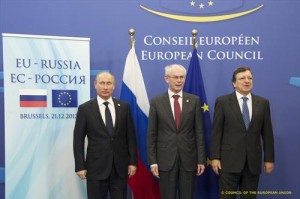
We have had a positive and constructive working summit. It provided us with an important occasion to take stock of main developments and to review progress and challenges across the wide range of EU-Russia relations. We also discussed how we can deepen our cooperation and implement already agreed commitments.
Our Partnership for Modernisation works. We have taken note of the latest Progress Report, and welcome the good results achieved in many areas. Further progress has to be made in the negotiations towards a New Agreement, which can put our future relations on a solid legal basis. The EU is very eager to progress faster in these negotiations.
We have discussed domestic economic developments in Russia and the EU. I explained the decisions of last week’s European Council regarding the strengthening of the EMU and the huge progress we made in stabilising the euro zone.
The EU is deeply convinced that we need to create space for civil society activities in order to achieve an effective modernisation of the economy and of the society.
We have noted the outcome of our latest Human Rights Consultations on 7 December which provided a useful occasion to discuss our concerns on the freedom for civil society activities and the exercise of fundamental rights in Russia. I mentioned also other concerns, including the case of Sergey Magnitsky.
As regards foreign policy, we have discussed ways to deepen our political cooperation at global level. We already work well together on issues like the Middle East Peace Process, Afghanistan or Iran. We have to continue our efforts to find a peaceful political solution on Syria in full support of Mr Brahimi’s efforts.
Russia and the EU work closely together in the Quartet, and we remain committed to a two-state solution to the Israeli-Palestinian conflict. In this respect I would like to highlight the joint statement by Foreign Minister Lavrov and High Representative Ashton today on the Middle East Peace Process.
As regards our Common Neighbourhood, I highlighted the need to achieve stability and security as well as democracy and a market-oriented economy. This is the aim of EU’s support within the Eastern Partnership Programme, especially as regards to Ukraine, Moldova and Georgia.
We welcome that the elections in Georgia open up new opportunities to improve bilateral relations and work towards stability in the Southern Caucasus, on the basis of the respect for territorial integrity.
It is particularly important to address the protracted conflicts. I also raised the importance of moving forward in the ‘5+2’ talks on the conflict in Transnistria and expressed concerns regarding developments in Nagorno-Karabakh.
By working together, the EU and Russia can make a decisive contribution to global governance and regional conflict resolution, to global economic governance in the G 8 and G 20, and to a broad range of international and regional issues. I would like to congratulate President Putin for taking over the presidency of G 20.
I am pleased that President Putin and the EU have discussed all these issues openly in a very constructive atmosphere. I want to thank the President of the Russian Federation for the constructive and productive exchange.
Press statement
by the President of the European Council
Herman Van Rompuy
following the 30th EU-Russia Summit.
Brussels, 21 December 2012
EUCO 243/12
PRESSE 557
PR PCE 206
Rapporti con gli Stati Uniti, crisi siriana, questioni interne. Vladimir Putin è stato incalzato da circa mille duecento giornalisti per quattro ore e mezza, molto più a lungo di quanto preventivato. Ad un certo punto è quasi sembrato che il capo del Cremlino non volesse più chiudere la mega-intervista per mostrare ai presenti di essere tornato in forma come ai bei tempi. I problemi di salute alla schiena di quest’autunno sono apparsi quindi superati. 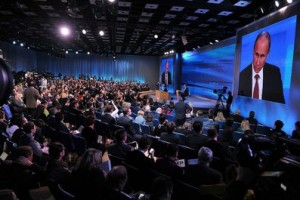
Il piglio del presidente russo nel rispondere alle domande, anche a quelle più scomode, è stato quello solito. Dopo aver sciorinato le cifre più che buone sullo stato dell’economia federale – Pil +3,7%, inflazione al 6,3%, tasso di disoccupazione al 5,4%, riserve valutarie pari a 527 miliardi di dollari – è iniziata l’interminabile maratona mediatica.
Vladimir Putin è d’accordo con l’iniziativa della Duma di bloccare le adozioni di bambini russi da parte di cittadini statunitensi. “Hanno cambiato – ha rimarcato il capo del Cremlino, andando all’attacco contro il Congresso Usa, – una legge anti-sovietica (ndr. la Jackson-Vinik del 1974) con una anti-russa”. Washington intende in quel modo colpire i corrotti e chi calpesta la democrazia in Russia. Una simile legge è già approdata anche all’Ue, a Strasburgo. Mosca ha subito reagito con una contro iniziativa legislativa anti-Usa. Non si è capito, però, perché siano state scelte le adozioni internazionali. Conclusione: a rimetterci saranno le migliaia di bambini abbandonati negli orfanatrofi russi.
I giornalisti presenti hanno fatto notare che le adozioni nazionali sono ben poca cosa rispetto all’enorme necessità di dare una casa alle centinaia di migliaia di sfortunati. Ma non c’è stato nulla da fare.
Parlando delle questioni aperte con la Casa bianca e sottolineando che i problemi sono sorti con la guerra in Iraq, Putin ha ricordato la spinosa questione dello Scudo anti-missilistico, che gli occidentali sono intenzionati a dislocare nel Vecchio Continente. “Che gli interessi russi vengano rispettati”, è stato il suo appello.
Mosca non è preoccupata per la sorte di Bashar al-Assad e capisce che “certamente servono cambiamenti in Siria. Quello che a noi interessa è cosa succederà dopo”. La vicenda libica ha insegnato che le soluzioni politiche vanno preferite a quelle militari, quando ci si trova di fronte al rischio della dissoluzione di uno Stato.
Putin ha negato che lo Stato da lui creato sia “autoritario”. Se fosse così l’attuale leader russo avrebbe fatto emandare nel 2008 la Costituzione, che vieta più di due mandati presidenziali. Così non è stato. “Abbiamo garantito la stabilità”, ha contro ribattuto Putin, secondo il quale “la democrazia non significa anarchia”. Per quanto riguarda l’ex oligarca Michail Khodorkovskij, ora in carcere, il capo del Cremlino ha messo in evidenza che il sistema giudiziario in Russia è indipendente da quello politico e lui non ha nulla a che vedere con quel caso. Anzi Putin si è augurato che una volta libero nel 2014 l’ex uomo più ricco del Paese goda di buona salute.
“Se Gerard ha bisogno di un permesso di soggiorno o di un passaporto russo – ha detto sorridendo Putin riferendosi all’attore francese Depardieu, che sta emigrando per evitare l’elevata imposta appena decisa da Parigi – il problema è risolto”.
The Ministry of Justice has received the independent report of the law firm Skadden, Arps, Slate, Meagher & Flom LLP, following its investigation of the Yulia Tymoshenko prosecution for exceeding her official powers at the conclusion of contracts between Russian Gazprom and Naftogaz Ukraine.
In accordance with the signed agreement, Skadden, Arps, Slate, Meagher & Flom LLP has delivered an independent report that clearly documents the events that were the subject of the trial and the trial itself. Through detailed analysis and a focus on the evidence, the report addresses critics, who have challenged the legal process and also the conviction, based on Yulia Tymoshenko’s claims that the prosecution was politically motivated and that her human rights have been abused. For this reason, the Ministry of Justice asked the leading international law firm to investigate the matter, taking into account all legal documents and opinions of all parties. 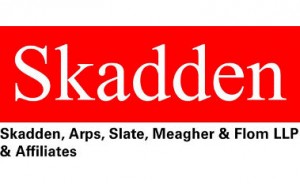
This report, published today on the Ministry’s website without amendment, concludes as groundless Yulia Tymoshenko’s claims that her prosecution was politically motivated and states that she has provided no factual evidence that would be sufficient to overturn her conviction under European or American standards.
The report also points out that Yulia Tymoshenko’s conduct in court would have been unacceptable in other countries and would likely have resulted in a contempt of court finding.
The Skadden, Arps, Slate, Meagher & Flom LLP report shows how Yulia Tymoshenko overstepped her authority and committed this crime:|
1. by drafting Directives that set forth the terms that she and Prime-minister of Russian Federation had agreed to;
2. by ordering the head of NAK Naftogaz Ukraine to sign an agreement with Gazprom in the absence of approval from the Cabinet of Ministers;
3. by threatening to fire the head of NAK Naftogaz Ukraine if he did not sign the agreement;
4. and by deceiving the head of NAK Naftogaz Ukraine into believing that the Cabinet of Ministers had approved the agreement after producing an official looking document bearing her signature and the seal of Ukraine’s Cabinet of Ministers, despite the fact no such approval had been given for the document named “Directives”.
Even where the Skadden, Arps, Slate, Meagher & Flom LLP Report questions certain procedural decisions by the court, it concludes that these decisions were based on actions by Tymoshenko designed to disrupt the court’s work.
The court concluded that Yulia Tymoshenko’s actions caused grave damage to Ukraine, since citizens of Ukraine continue to pay the highest prices in Europe for their gas due to Tymoshenko’s deal with Russia. In this sense, every citizen of this country is a victim of this crime.
The Ministry of Justice is grateful to Skadden, Arps, Slate, Meagher & Flom LLP for this professional analysis that unconditionally lays out the facts of this matter.
Contact: Press Office – Ministry of Justice
Telephone: +38 044 271 17 33
Email: press@minjust.gov.ua
Ad Anapa sul mar Nero si è tenuta la cerimonia della posa della prima pietra. Negli ultimi mesi la Gazprom ha proceduto a tappe forzate per arrivare all’inizio dei lavori. Uno degli obiettivi della decisione è stato quello di evitare che il Terzo pacchetto energia dell’Ue potesse bloccare o comunque ostacolare il progetto.
La potenzialità della pipeline, che cambierà le strategie per l’approvvigionamento di energia sul corridoio sud europeo, è di 63 miliardi di metri cubi di gas all’anno (circa il 10% del consumo totale di gas in Europa nel 2020). Il costo finale 16 miliardi di euro. Tempo di costruzione: 3 anni. Il South Stream evita il transito in Ucraina, protagonista di ben due guerre del gas con Mosca. 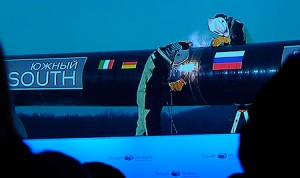
In un incontro con la stampa Marcel Kramer, amministratore delegato di South Stream Transport – il consorzio tra Gazprom (50%), Eni (25%), Edf (15%) e Wintershall (15%), preposto a realizzare il tratto offshore – ha definito la pipeline un “progetto visionario” per impegno economico e importanza strategica.
Stando alle stime dell’Agenzia internazionale dell’Energia (Iea), la domanda di gas naturale in Europa e’ destinata a salire dai 536 miliardi di metri cubi, del 2010, a 618 miliardi, nel 2035. Un aumento, all’incirca, del 15%.
Posato a una profondità massima di oltre 2.000 metri, il South Stream percorrerà 925 chilometri sotto il livello del mare, collegando Anapa con il porto bulgaro di Varna, attraverso le acque territoriali turche. Il percorso totale (2.600 chilometri), nella sua tratta onshore (1.455 chilometri), comprende anche: Serbia, Ungheria, Slovenia e Italia. Capolinea del South Stream sarà Tarvisio.
Greenpeace has criticised Poland hosting the UN climate summit in 2013, as announced at the UN Framework Convention on Climate Change in Doha, Qatar. “A host country should be firmly committed to climate protection and be able to negotiate compromises and seal deals, but Poland has a bad track record on both counts,” says Greenpeace’s Jiri Jerabek. 
Ministers and NGOs are at the 18th Global climate change conference, which opened in Qatar on November 26th, with representatives from nearly 200 nations convening for two weeks of talks aimed at curbing global carbon emissions.
Poland has been slammed for its record on environmental issues after it blocked raising EU carbon emission targets and its decision to go ahead with shale gas extraction and building a nuclear power station.
“We have experience organizing the 2008 Conference of Parties and heading the European Union delegation at the previous climate summit,” Polish environment minister Marcin Korolec said in a message sent to the Bloomberg news agency. “We know how to grow and cut emissions. All ingredients are there for a good negotiation session.”
“We are sending a clear signal that the main priority of climate policy should be the signing of a global deal,” Korolec added. “Europe will only be able to lead the process if we manage to convince our partners to join.”
Poland hosted the UN climate summit in 2008 when 10,000 delegates attended the conference in Poznan.
Source: Polish Radio and Bloomberg
Medio Oriente, la posizione russa.
24 Nov 2012 Israeliani e palestinesi hanno i soliti scontri ciclici. In Siria assistiamo ad una guerra tra arabi. Il Cremlino difende nella regione i suoi tradizionali alleati. Questo è il quadro tracciato da Adzhar Kurtov, uno dei massimi esperti russi di Medio oriente.
“A Gaza – sostiene lo specialista dell’Istituto di ricerche strategiche di Mosca – si è osservato una lotta tra impari: una parte (gli israeliani) armata di tutto punto, l’altra (i palestinesi) no. Adesso tutto tornerà come prima, fino ad una prossima campagna”. 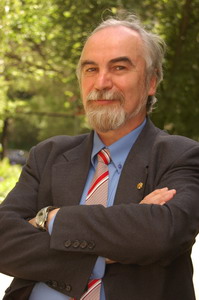
Certo, molte delle armi di Hamas sono state distrutte. Ma quale è il vero ruolo della Russia nello scacchiere mediorientale? “La Russia ha una posizione chiara sulla crisi siriana. Primo: blocco delle interferenze esterne con aiuti ai gruppi armati. Siamo di fronte ad una vera aggressione, non nascondiamocelo. Secondo: ricerca di una soluzione negoziale. Se il recente cambio di Costituzione non va bene serve definire una nuova Legge Fondamentale. Che si tengano le elezioni! Ormai vi sono gruppi di Paese, mi riferisco a quelli del Golfo in particolar modo, che riconoscono un altro governo siriano”.
Mosca mantiene ancora una qualche influenza nell’area? “La Russia non è più l’Urss. Ha meno influenza come hanno dimostrato le recenti ‘primavere’ arabe. Il Cremlino rimane però fermo sulle proprie posizioni. Prima fra tutte: difendere i propri alleati. Poi mettere il diritto internazionale davanti a qualsiasi crisi. E’ vero l’export russo di armi è importante. Ma i nostri primi compratori sono gli indiani e i cinesi”.
Non è che i Paesi del Golfo abbiano colmato quel vuoto di influenza nel Medio oriente lasciato vacante dall’Urss? “Stiamo assistendo ad uno scontro all’interno del mondo arabo. I Paesi più conservatori, mi riferisco al Qatar ed all’Arabia Saudita (entrambi sunniti), cercano di regolare i propri conti con gli sciiti. Le operazioni in Siria mirano a colpire il maggiore alleato dell’Iran (sciita). Come tutte le guerre religiose anche questa è cruenta”.
L’Occidente sembra rimasto in disparte a guardare. “Gli Stati Uniti sono interessati all’indebolimento del regime degli ayatollah ed alla sua sostituzione a Teheran con uno pro-occidentale. Il rischio di perdere il controllo della situazione è alto. L’Afghanistan dei talebani insegna qualcosa, no? A Washington, però, si è convinti di creare ad altri i problemi, non a sé stessi”.
In conclusione, tornando alla questione di Gaza come finirà? “Non credo che nel breve periodo vedremo due Stati, uno israeliano ed uno palestinese. Non v’è alcuna volontà di riconciliazione. Al massimo si potranno congelare i dissidi”.
“This museum is an eloquent declaration of the principles of tolerance toward people and their freedom,” said at the inauguration Israeli President Shimon Peres, 89, who was born in what is now Belarus before his family settled in Palestine in the 1930s. Peres recalled that both his parents had been born in the Russian Empire and everyone at home spoke “Yiddish, Hebrew and Russian”, while his mother had sung him Russian songs. “Here we can see man part with the past and move into the future with hope.” “The museum tells us about two ideologies – communism and Zionism,” he added. 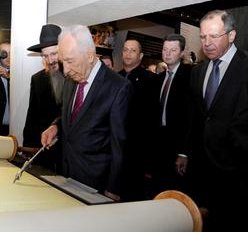
President Vladimir Putin hoped the new museum would become “a place for dialogue and agreement between peoples,” said a statement read at the ceremony by Lavrov. “Any attempt to review the contribution of our country to WWII victory or to deny the Holocaust is not just a cynical lie but a forgetting of history,” Putin’s statement added.
The idea of establishing the museum came from the Federation of Jewish Communities of Russia, which was given the museum building in 2001. Grafts’ renovation and expansion of the 1927 Konstantin Melnikov’s bus depot have transformed the space into the world’s largest Jewish museum. The museum occupies over 8,500 square meters on the Moscow Bakhmetyevsky Garage which was formerly an art gallery run by socialite Dasha Zhukova.
The museum aims to demonstrate Jewish cultural traditions and customs and also show the history of Russia through the prism of one ethnic group, organizers say.
Like its ‘twins’ in New York, Paris and Berlin, the Moscow museum highlights historic Jewish documents, photographs and letters spanning a period of more over two centuries.
Jews were repressed in Tsarist times when starting in the late 18th century they were largely forced to live in an area of the western Russian empire known as the “Pale” where many lived in impoverished towns known as shtetls.
Hitler‘s armies in World War II then occupied most of today’s Belarus, Ukraine as well as western Russia, leaving Soviet Jews exposed to the full brunt of the Nazi killing regime.Heavily targeted during the 1930s purges, Jews suffered even after World War II in the USSR under Stalin’s rule, especially when the purported discovery of a so-called “doctors’ plot” against him unleashed a wave on anti-Semitic hysteria.
Nonetheless Jews have over centuries made a huge contribution to Russian culture, ranging from the writer Sholem Aleichem, the Vitebsk-born artist Marc Chagall or the poet Osip Mandelstam who died in the Stalin camps.
Sources: Ria Novosti, EJR.
Russia and the whole Eastern Europe are observing the last days of the US presidential campaign with great interest. Barack Obama and his challenger, Mitt Romney, represent an opposite approach to the problems of the region.
In 2009 the now outgoing president launched the “reset” policy in order to restore the relationship with the Kremlin after the war in Georgia. During his campaign the candidate of the Republicans has promoted Russia to “number 1 geostrategic foe of the United States”. 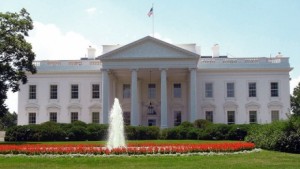
So, the question is: if Romney wins, will Europe come back to the Cold War epoch?
The answer is negative. First of all, even if Russia is considered a “resurgent” power by the experts it has finally lost the status of superpower held by the Soviet Union until 1991. At the moment, it has a more limited weight in the world’s political, economic, and military affairs.
Moscow is no more a hated enemy, as it was for four decades in the 20th century. It is a useful ally in places like Afghanistan, but also a partner, who has often criticized the Western positions on issues like Syria or Iran, and an energy supplier to the US strategic reserves.
In short, Russia is not a threat for Washington or the European Union as it was the Soviet Union. Today’s challenges in the era of the globalization are completely different from those of the past.
Mitt Romney killed two birds with one stone. He used that old fashioned definition, because he simply wanted to attack Obama and its foreign policy, not Russia, that remains – anyway in elderly American people mind – an adversary.
Barack Obama promised the Russians to be more “flexible” after the elections. In 2009 he started a new period in the bilateral relationship, but he did not invite Moscow to join from inside the regional anti-missile Shield in the future controlling Headquarters.
That would represent the decisive recognition of the successful end of the Russian democratic evolution which began in 1991. Former Kremlin’s European satellites, now US allies, are still hesitant to make that historic step. Protests in Moscow and the repression of the dissent will further delay any other openings.
Nonetheless, in these four years there have been positive changes in the US-Russian relationship. Moscow and Washington signed the nuclear arms control treaty in 2010 and this year the White House has supported Russia’s accession to the World Trade Organization.
Vladimir Putin has recently described Barack Obama as “a genuine person” who “really wants to change much for the better”. The Russian leadership, including Dmitry Medvedev, has good personal relationship with him and, if it were able to vote the Kremlin would choose Obama.
But if Romney is elected president it will not be a catastrophe. From the internal political perspective Romney’s victory would guarantee president Putin a useful adversary determined to subvert the state of rule in the Motherland and former USSR. And it would be easier to justify the astronomically expensive 10-year rearmament plan for the armed forces ($770 billion), especially now when the economic crisis is narrowing and social problems are becoming more serious every day.
Giuseppe D’Amato
Welcome
We are a group of long experienced European journalists and intellectuals interested in international politics and culture. We would like to exchange our opinion on new Europe and Russia.
Categories
- Breaking News (11)
- CIS (129)
- Climate (2)
- Energy&Economy (115)
- EU Eastern Dimension (85)
- Euro 2012 – Sochi 2014 – World Cup 2018, Sport (43)
- Euro-Integration (135)
- History Culture (198)
- International Policy (261)
- Military (74)
- Interviews (18)
- Italy – Italia – Suisse (47)
- Odd Enough (10)
- Poland and Baltic States (126)
- Religion (31)
- Russia (421)
- Survey (4)
- Turning points (4)
- Ukraine (176)
- Российские страницы (113)
Archives
- November 2020
- October 2020
- September 2020
- August 2020
- July 2020
- May 2020
- April 2020
- March 2020
- January 2020
- December 2019
- November 2019
- October 2019
- September 2019
- August 2019
- July 2019
- June 2019
- May 2019
- April 2019
- March 2019
- February 2019
- December 2018
- November 2018
- October 2018
- September 2018
- August 2018
- July 2018
- June 2018
- May 2018
- April 2018
- March 2018
- February 2018
- January 2018
- December 2017
- November 2017
- October 2017
- September 2017
- August 2017
- July 2017
- May 2017
- March 2017
- January 2017
- December 2016
- November 2016
- October 2016
- September 2016
- July 2016
- June 2016
- May 2016
- April 2016
- February 2016
- January 2016
- November 2015
- October 2015
- September 2015
- June 2015
- April 2015
- March 2015
- February 2015
- January 2015
- December 2014
- November 2014
- October 2014
- September 2014
- August 2014
- July 2014
- June 2014
- May 2014
- April 2014
- March 2014
- February 2014
- January 2014
- December 2013
- November 2013
- October 2013
- September 2013
- August 2013
- July 2013
- June 2013
- May 2013
- April 2013
- March 2013
- February 2013
- January 2013
- December 2012
- November 2012
- October 2012
- September 2012
- August 2012
- July 2012
- June 2012
- May 2012
- April 2012
- March 2012
- February 2012
- January 2012
- December 2011
- November 2011
- October 2011
- September 2011
- August 2011
- July 2011
- June 2011
- May 2011
- April 2011
- March 2011
- February 2011
- January 2011
- December 2010
- November 2010
- October 2010
- September 2010
- August 2010
- July 2010
- June 2010
- May 2010
- April 2010
- March 2010
- February 2010
- January 2010
- December 2009
- November 2009
- October 2009
- September 2009
- August 2009
Our books




